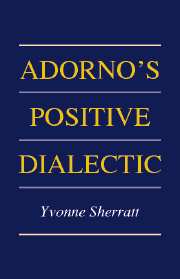Book contents
- Frontmatter
- Contents
- Preface
- Abbreviations
- Adorno's Positive Dialectic
- General Introduction
- PRELUDE TO ADORNO'S POSITIVE DIALECTIC
- Prelude I: Adorno's Intellectual Tradition: German Philosophy
- Prelude II: Adorno's Intellectual Tradition: Sigmund Freud
- ADORNO'S POSITIVE DIALECTIC: INTRODUCTION
- PART I NEGATIVE THESIS: THE DECLINE OF ENLIGHTENMENT
- PART II POSITIVE THESIS: THE REDEMPTION OF ENLIGHTENMENT
- 5 The Aesthetic: Aura
- 6 Knowledge Acquisition: An Aesthetic Form
- 7 A Positive Dialectic of Knowledge Acquisition
- 8 A Positive Dialectic of Subjectivity: The Instincts
- 9 A Positive Dialectic of Subjectivity: The Structure of The Self
- Concluding Comments
- Bibliography
- Index
9 - A Positive Dialectic of Subjectivity: The Structure of The Self
Published online by Cambridge University Press: 10 August 2009
- Frontmatter
- Contents
- Preface
- Abbreviations
- Adorno's Positive Dialectic
- General Introduction
- PRELUDE TO ADORNO'S POSITIVE DIALECTIC
- Prelude I: Adorno's Intellectual Tradition: German Philosophy
- Prelude II: Adorno's Intellectual Tradition: Sigmund Freud
- ADORNO'S POSITIVE DIALECTIC: INTRODUCTION
- PART I NEGATIVE THESIS: THE DECLINE OF ENLIGHTENMENT
- PART II POSITIVE THESIS: THE REDEMPTION OF ENLIGHTENMENT
- 5 The Aesthetic: Aura
- 6 Knowledge Acquisition: An Aesthetic Form
- 7 A Positive Dialectic of Knowledge Acquisition
- 8 A Positive Dialectic of Subjectivity: The Instincts
- 9 A Positive Dialectic of Subjectivity: The Structure of The Self
- Concluding Comments
- Bibliography
- Index
Summary
INTRODUCTION
In this chapter we reply to the problems raised in Chapter 2, namely the regression of the enlightenment self to narcissism. We show how a dialectic at the level of the instincts implies a similar dialectic at the structural level of the self. We explore Freud's single notion of psychic unity and Adorno's derivation of three conceptions of unity from this. One of these is positive. We give an account of the inter-relationship of unity and separateness in Adorno's work and show how this provides a positive dialectic in the structure of the self.
UNITY
We have seen in Chapter 2 that Adorno builds upon Freud's notion of what constitutes the most important structure of the self, namely the boundary around it. A strong boundary, for Adorno, following Freud, is essential for the maintenance of a strong sense of self (indeed any sense of self). It provides these interconnected features: (a) a sense of self; (b) a sense of the demarcation between the self and external Objects; (c) a capacity to discriminate between Objects.
As with Freud, Adorno perceives the loss of this boundary as regressive, as leading to narcissism. Narcissism as the deterioration of this boundary entails: (a) a weakening of the sense of self; (b) a weakening of a sense of the demarcation between the self and external Objects; (c) an inability to discriminate between Objects.
Adorno criticises the enlightenment for entailing a loss of the self's boundary.
- Type
- Chapter
- Information
- Adorno's Positive Dialectic , pp. 224 - 232Publisher: Cambridge University PressPrint publication year: 2002



